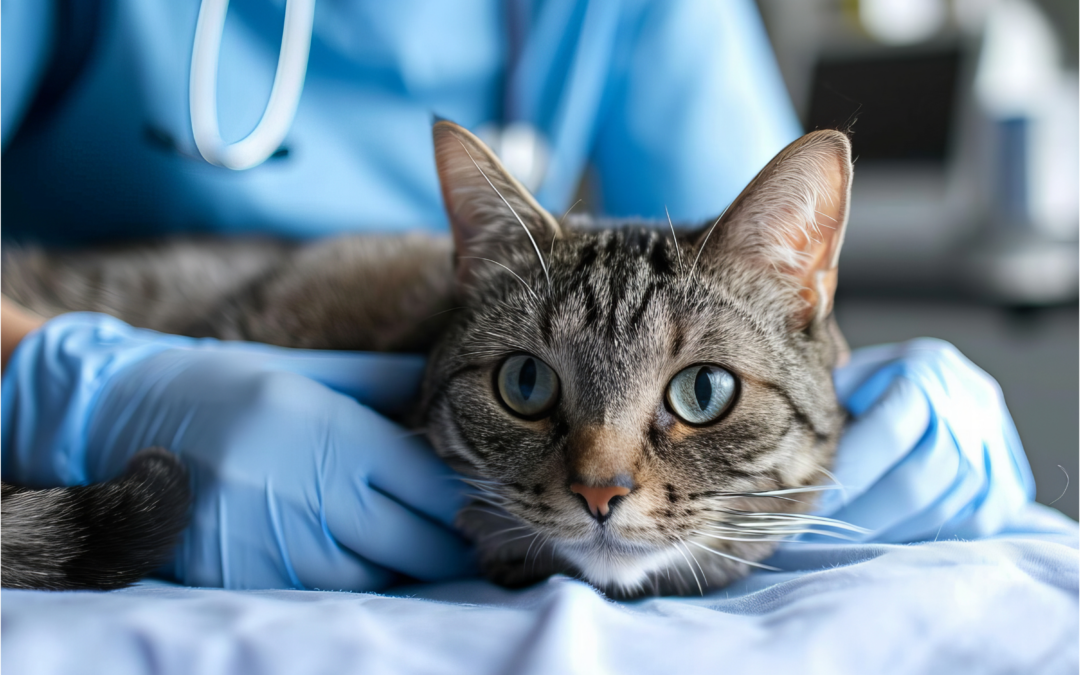No pet owner wants to hear that their pet has been diagnosed with a condition that requires surgical intervention. In some cases, your pet’s primary care veterinarian can perform the surgery, but there are many injuries and illnesses where advanced veterinary surgery techniques, performed by a board-certified veterinary surgeon, can significantly improve outcomes and enhance the overall quality of care.
In this blog post, we will delve into the world of advanced pet surgery, exploring what it offers pets and pet owners, what a board-certified surgeon is, and the impact of these innovations on the well-being of our beloved animal companions.
When is advanced surgery needed for a pet?
Advanced surgery may be necessary when a pet is diagnosed with a medical condition requiring surgical intervention. This may include complex procedures such as orthopedic, cardio/thoracic, neurologic, soft tissue, or minimally invasive surgery. Pets can also benefit from advanced surgery for conditions that do not respond to traditional treatment methods or for cases where precision and advanced techniques can significantly improve results. In such instances, seeking specialty services that offer the expertise of a board-certified veterinary surgeon can play a crucial role in ensuring the best possible outcome for the pet.
What is a board-certified veterinary surgeon?
A veterinary surgeon is a veterinarian who completed extensive training after veterinary school and has been certified as a specialist in veterinary surgery by the American College of Veterinary Surgeons (ACVS). ACVS board-certified veterinary surgeons are often referred to as ACVS Diplomates and will have DACVS (Diplomate, American College of Veterinary Surgeons) after their name. The DACVS credential indicates that the veterinary surgeon completed ACVS’ rigorous certification requirements, including a minimum of a one-year internship followed by a three-year residency program that meets guidelines established by ACVS. They must also conduct research published in a scientific journal and pass rigorous board examinations. Only an ACVS board-certified veterinarian can call themselves a surgical specialist or veterinary surgeon.
How does a board-certified surgeon work with a pet’s primary care veterinarian?
When a pet requires advanced surgical intervention, the primary care veterinarian will refer the pet to a board-certified surgeon for treatment. The surgeon will consult with the veterinarian to understand the pet’s medical history, previous treatments, and overall health status. This collaboration allows for a seamless transition of care, with the veterinarian providing vital insights and ongoing support, while the surgeon plans and executes the necessary advanced surgical procedures.
After surgery, the surgeon communicates with the pet’s veterinarian to facilitate post-operative care and ensure continued well-being. This approach ensures that the pet receives the best possible care, combining the family veterinarian’s and specialized surgeon’s knowledge and skills.
Veterinary Surgery at BEVS
BEVS offers a full range of surgical services, from the most routine to the most advanced, including:
- Cardiothoracic/cardiopulmonary surgery to address heart and lung issues
- Emergency and trauma surgery available 24/7
- Gastrointestinal/hepatobiliary surgery (liver and gallbladder)
- Minimally invasive surgery such as fractures, luxations, and abdominal and thoracic procedures to reduce perioperative pain, speed recovery, and improve outcomes
- Oncology surgery to remove cancerous tumors
- Orthopedic surgery to repair such conditions as fractures and other musculoskeletal injuries, cruciate ligament tears, hip and elbow dysplasia, and osteochondritis
- Soft-tissue surgery relating to internal organs, skin and muscle
- Reconstructive surgery to restore form and function after trauma or cancer surgery
- Urinary tract surgery
Diagnostic Tools
Advanced diagnostic tools are crucial in identifying and treating surgical conditions, and provide our surgical team with the most accurate diagnostic planning available.
We have invested in the following imaging tools, located on-site:
- C-Arm Fluoroscopy
- Computed Tomography (CT)
- Digital Radiology (X-Ray)
- Scope Tower (arthroscopy/laparoscopy/thoracoscopy)
- Ultrasound
BEVS’ Surgery Department
Our Surgery Department is led by board-certified surgeon, Jacob Helmick, DVM, DACVS-SA, along with Alexandra Kuvaldina, DVM (Practice Limited to Surgery), their team of skilled veterinary technicians, and a highly trained and compassionate support staff.
Additionally, we offer:
- State-of-the-art surgical suites that offer the most advanced surgical and monitoring equipment
- The latest anesthesia protocols are employed with a veterinary nurse devoted to anesthetic monitoring
- An around-the-clock staff of skilled and caring veterinarians and veterinary nurses who carefully monitor your pet’s vital signs
- The modern and personalized pain management techniques to keep your pet comfortable during and after surgery
Care and Compassion
The improvement of advanced veterinary surgery is unique and exciting, but at BEVS, we know that technological advancements are only one part of the equation. Take comfort in knowing that our team is renowned for the care and compassion they show to every pet and pet family.
If you have any questions about advanced surgery at BEVS or your pet has been referred to our Surgery Department, call us today at 802-863-2387 for more information or to schedule an appointment.

